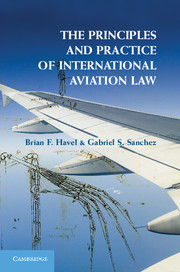Book contents
- Frontmatter
- Contents
- Preface
- Acknowledgments
- Table of Abbreviations and Acronyms
- 1 What is International Aviation Law?
- 2 The Foundations of Public International Aviation Law
- 3 The International Law Regime for Trade in Air Services
- 4 The International Law Regime for Airline Investment and Global Alliances
- 5 The International Law Regime for Aviation Safety and Security
- 6 The International Law Regime for Aviation and the Environment
- 7 The International Law Regime for Air Carrier Liability and Surface Damage
- 8 The International Law Regime for Aircraft Financing and Aircraft Nationality
- Afterword
- Select Bibliography
- Table of Authorities
- Index
- References
6 - The International Law Regime for Aviation and the Environment
Published online by Cambridge University Press: 05 June 2014
- Frontmatter
- Contents
- Preface
- Acknowledgments
- Table of Abbreviations and Acronyms
- 1 What is International Aviation Law?
- 2 The Foundations of Public International Aviation Law
- 3 The International Law Regime for Trade in Air Services
- 4 The International Law Regime for Airline Investment and Global Alliances
- 5 The International Law Regime for Aviation Safety and Security
- 6 The International Law Regime for Aviation and the Environment
- 7 The International Law Regime for Air Carrier Liability and Surface Damage
- 8 The International Law Regime for Aircraft Financing and Aircraft Nationality
- Afterword
- Select Bibliography
- Table of Authorities
- Index
- References
Summary
ICAO’s Response to a Politically Contentious Issue
The impact of aviation on the global environment has become one of the most politically contentious issues in international aviation law and policy. For that reason, it remains an inadequately addressed facet of air transport at the international level. That assertion may strike some as surprising given the resources that the International Civil Aviation Organization (ICAO) has dedicated to studying the effects of aviation on the environment, including assessment of the industry’s responsibility for the phenomenon of climate change or “global warming.” ICAO’s Committee on Aviation Environmental Protection (CAEP), which is comprised of members from ICAO State parties, intergovernmental entities, and nongovernmental organizations, produces regular updates on aviation’s environmental impact and determines whether adjustments should be made to any of ICAO’s Standards and Recommended Practices (SARPs) that concern the environment. In 2007, ICAO established a second environmental task force, the Group on International Aviation and Climate Change (GIACC), to find sustainable solutions to aviation’s contribution to climate change. Although long-term solutions must include technological innovations such as biofuel replacement of kerosene, the Group is actually focused on more immediate economic concerns, exploring, for example, how States can use so-called ‘market-based measures’ (MBMs), such as eco-taxes and cap-and-trade systems, to incentivize airlines to reduce emissions without inflicting serious economic harm on the sector. To date, neither of these ICAO entities has produced a workable road map for the industry’s approach to climate change. Nor has the Organization itself been able to engineer a global sectoral approach to cutting aviation emissions despite being charged to do so by both the U.N. multilateral treaty on global climate change and by its own membership.
- Type
- Chapter
- Information
- The Principles and Practice of International Aviation Law , pp. 217 - 250Publisher: Cambridge University PressPrint publication year: 2014



